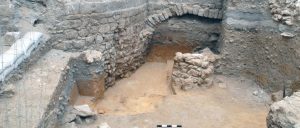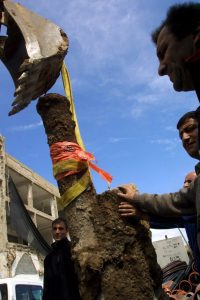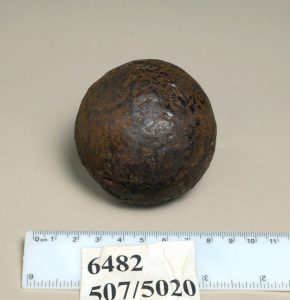Archaeologists discovered a mass grave containing disarticulated remains of about 40 bodies in two mass graves in Jaffa, Israel, dating to the late 18th century, linked to Napoleon’s struggle against the Ottoman Empire.

Researches suggest that the bodies might belong Ottoman soldiers massacred by French troops in 1799 or could be the victims of epidemics that swept through Palestine at the time. Archaeologists state that, the grave has a fairly even division of men, women and children, from infancy to post-60 years old, which is what you would find civilian cemeteries of the time. The main cache of bones was found during a salvage excavation in the Kishle, the Ottoman police compound in Jaffa. A second concentration was uncovered near an 18th century fortification unearthed at the southern end of Roslan Street. The wall, 1.30 metres thick, was built over foundation arches, a hallmark of large-scale Ottoman construction in Jaffa in from the late 18th to early 20th centuries.

Napoleon wanted to conquer Egypt, and the Levantine coast up to Syria. In May 1798, he sailed for Egypt, leading a force of 54,000 soldiers and a corps of scientists. On June 11, the French forces captured Malta, from where they launched the invasion of Egypt. Landing safely near Alexandria on July 2, 1798, the French army conquered the city, then set out for Cairo, which was taken on July 24. On February 6, 1799, the French army crossed into the Sinai Desert. After initial battles the Turkish soldiers fled north toward Jaffa. The French took about 2000 enemy soldiers as prisoners. Napoleon released them, after they swore not to take up arms against the French. On March 3, the French army reached the fortified hilltop city of Jaffa. The Ottoman fortress with its 1.3-meter thick walls constituted a formidable challenge. As the French and Turks struggled, the Turks collected the heads of fallen French infantry soldiers, and placed the severed heads on poles above the walls. They even killed a peace emissary sent by the French. After a general assault 3000 Turkish soldiers, including ones earlier set free by Napoleon, were willing to surrender if their lives would be spared. Napoleon ordered to execute these soldiers who in defiance of their previous capitulation, had been found bearing arms against him. After conquering Jaffa in March, the French army marched north along the coast, suffering from heat, mosquitoes and disease – and the plague, which broke out in Palestine.

(after Pavel Wolberg, Clara Amit, Tsila Sagiv & Israel Antiquities Authority)